William Shakespeare莎士比亚代表诗歌翻译及赏析
William Shakespeare威廉莎士比亚中英对照
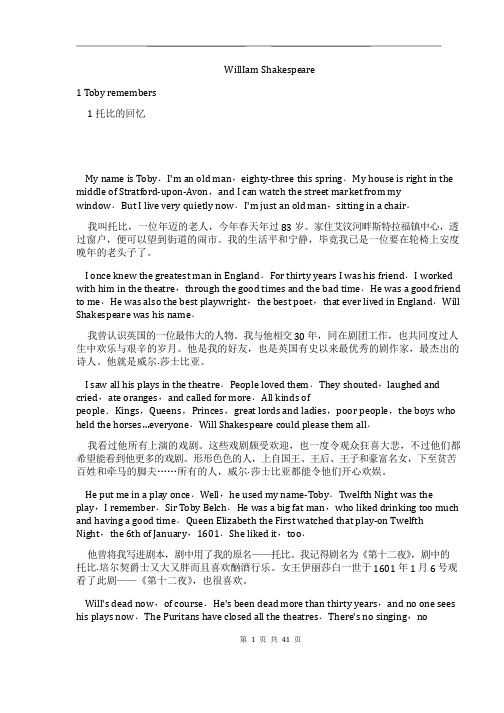
WillIam Shakespeare1Toby remembers1托比的回忆My name is Toby.I'm an old man,eighty-three this spring.My house is right in the middle of Stratford-upon-Avon,and I can watch the street market from my window.But I live very quietly now.I'm just an old man,sitting in a chair.我叫托比,一位年迈的老人,今年春天年过83岁。
家住艾汶河畔斯特拉福镇中心,透过窗户,便可以望到街道的闹市。
我的生活平和宁静,毕竟我已是一位要在轮椅上安度晚年的老头子了。
I once knew the greatest man in England.For thirty years I was his friend.I worked with him in the theatre,through the good times and the bad time.He was a good friend to me.He was also the best playwright,the best poet,that ever lived in England.Will Shakespeare was his name.我曾认识英国的一位最伟大的人物。
我与他相交30年,同在剧团工作,也共同度过人生中欢乐与艰辛的岁月。
他是我的好友,也是英国有史以来最优秀的剧作家,最杰出的诗人。
他就是威尔·莎士比亚。
I saw all his plays in the theatre.People loved them.They shouted,laughed and cried,ate oranges,and called for more.All kinds ofpeople.Kings,Queens,Princes,great lords and ladies,poor people,the boys who held the horses…everyone.Will Shakespeare could please them all.我看过他所有上演的戏剧。
十四行诗18英文赏析-莎士比亚[整理版]
![十四行诗18英文赏析-莎士比亚[整理版]](https://img.taocdn.com/s3/m/faf35c37bdd126fff705cc1755270722192e59c0.png)
莎士比亚的第18首十四行诗的英文赏析我能否将你比作夏天?你比夏天更美丽温婉。
狂风将五月的蓓蕾凋残,夏日的勾留何其短暂。
休恋那丽日当空,转眼会云雾迷蒙。
休叹那百花飘零,催折于无常的天命。
唯有你永恒的夏日常新,你的美貌亦毫发无损。
死神也无缘将你幽禁,你在我永恒的诗中长存。
只要世间尚有人吟诵我的诗篇,这诗就将不朽,永葆你的芳颜。
这首诗的艺术特点首先是在于它有着双重主题:一是赞美诗人爱友的美貌,二是歌颂了诗歌艺术的不朽力量。
其次就是诗人在诗中运用了新颖的比喻,但又自然而生动。
Sonnet 18, often alternately titled Shall I compare thee to a summer's day?, is one of the best-known of 154 sonnets written by the English playwright and poet William Shakespeare. Part of the Fair Y outh sequence (which comprises sonnets 1-126 in the accepted numbering stemming from the first edition in 1609), it is the first of the cycle after the opening sequence now described as the Procreation sonnets. Most scholars now agree that the original subject of the poem, the beloved to whom the poet is writing, is a male, though the poem is commonly used to describe a woman.In the sonnet, the poet compares his beloved to the summer season, and argues that his beloved is better. The poet also states that his beloved will live on forever through the words of the poem. Scholars have found parallels within the poem to Ovid's Tristia and Amores, both of which have love themes. Sonnet 18 is written in the typical Shakespearean sonnet form, having 14 lines of iambic pentameter ending in a rhymed couplet. Detailed exegeses have revealed several double meanings within the poem, giving it a greater depth of interpretation.Sonnet 18 is a typical English or Shakespearean sonnet. It consists of three quatrains followed by a couplet, and has the characteristic rhyme scheme: abab cdcd efef gg. The poem carries the meaning of an Italian or Petrarchan Sonnet. Petrarchan sonnets typically discussed the love and beauty of a beloved, often an unattainable love, but not always.[5] It also contains a volta, or shift in the poem's subject matter, beginning with the third quatrain.A facsimile of the original printing of Sonnet 18.The poem starts with a line of adoration to the beloved—"Shall I compare thee to a summer's day?" The speaker then goes on to say that the beloved being described is both "more lovely and more temperate" than a summer's day. Thespeaker lists some things that are negative about summer. It is too short—"summer's lease hath all too short a date"—and sometimes the sun shines too hot—"Sometime too hot the eye of heaven shines." However, the beloved being described has beauty that will last forever, unlike the fleeting beauty of a summer's day. By putting his love's beauty into the form of poetry, the poet is preserving it forever by the power of his written words. "So long as men can breathe, or eyes can see, So long lives this, and this gives life to thee." The hope is that the two lovers can live on, if not through children, then through the poems brought forth by their love which, unlike children, will not fadeA major feature of this poem - analogy. Begins with the first sentence, put "you" and "Summer" as a analogy, compare the second line of the initial determination: Are you more lovely than the summer, more gentle. The difference is due to produce its in-depth analysis of 3 to 14 lines. Specifically, the first line of 3.4.5.6.7.8 enumerated the "summer" all kinds of regrets, and 9.10.11.12.13.14 line tells the "you" all kinds of advantages compared to the natural draw a final conclusion: "Y ou" is far better than "Summer," "you" because in his poetry between the lines but also has a life, and time forever. Also noteworthy is the verse 13 and 14 are also, by analogy emphasized the "eternal nature."Throughout the poem, the poet freely to the "you" talk, it seems that "you" is a living person, to listen to his voice, understanding his thinking. So this poem can be said to be people in the application of techniques based on the written. The poem "Y ou" refers to an object, academia, there are two explanations, one view is that it refers to beauty, and the other that it refers to poetry to express the good things. Now most scholars prefer the latter.One of the best known of Shakespeare’s sonnets, Sonnet 18 is memorable for the skillful and varied presentation of subject matter, in which the poet’s feelings reach a level of rapture unseen in the previous sonnets. The poet here abandons his quest for the youth to have a child, and instead glories in the youth’s beauty.On the surface, the poem is simply a statement of praise about the beauty of the beloved; summer tends to unpleasant extremes of windiness and heat, but the beloved is always mild and temperate. Summer is incidentally personified as the "eye of heaven" with its "gold complexion"; the imagery throughout is simple and unaffected, with the "darling buds of May" giving way to the "eternal summer", which the speaker promises the beloved. The language, too, is comparatively unadorned for the sonnets; it is not heavy with alliteration or assonance, and nearly every line is its own self-contained clause--almost every line ends with some punctuation, which effects a pause.Initially, the poet poses a question―”Shall I compare thee to a summer’s day?”―and then reflects on it, remarking that the youth’s beauty far surpasses summer’s delights. The imagery is the very essence of simplic ity: “wind”and “buds.”In the fourth line, legal terminology―”summer’s lease”―is introduced in contrast to the commonplace images in the first three lines. Note also the poet’s use of extremes in the phrases “more lovely,”“all too short,”and “too hot”; these phrases emphasize the young man’s beauty.Although lines 9 through 12 are marked by a more expansive tone and deeper feeling, the poetreturns to the simplicity of the opening images. As one expects in Shakespeare’s sonnets, the proposition that the poet sets up in the first eight lines―that all nature is subject to imperfection―is now contrasted in these next four lines beginning with “But.”Although beauty naturally declines at some point―”And every fair from fair sometime declines”―the youth’s beauty will not; his unchanging appearance is atypical of nature’s steady progression. Even death is impotent against the youth’s beauty. Note the ambiguity in the phrase “eternal lines”: Are these “lines”the poet’s verses or the youth’s hoped-for children? Or are they simply wrinkles meant to represent the process of aging? Whatever the answer, the poet is jubilant in this sonnet because nothing threatens the young man’s beautiful appearance.Sonnet 18 is the first poem in the sonnets not to explicitly encourage the young man to have children. The "procreation" sequence of the first 17 sonnets ended with the speaker's realization that the young man might not need children to preserve his beauty; he could also live, the speaker writes at the end of Sonnet 17, "in my rhyme." Sonnet 18, then, is the first "rhyme"--the speaker's first attempt to preserve the young man's beauty for all time. An important theme of the sonnet (as it is an important theme throughout much of the sequence) is the power of the speaker's poem to defy time and last forever, carrying the beauty of the beloved down to future generations. The beloved's "eternal summer" shall not fade precisely because it is embodied in the sonnet: "So long as men can breathe or eyes can see," the speaker writes in the couplet, "So long lives this, and this gives life to thee."大多数莎学家认为,是作者赞美好友的超常之美的。
莎士比亚十四行诗原文译文探析

莎士比亚十四行诗原文译文探析莎士比亚(William Shakespeare)作为英国文学史上最重要的艺术家之一,其作品一直被世人推崇。
他的十四行诗(sonnet)尤为著名,这些诗歌探讨了爱情、时间、美丽和死亡等永恒的主题。
本文将深入探讨莎士比亚十四行诗的原文及其中文译文,并分析其中蕴含的深刻意义。
首先我们来看莎士比亚的第一首十四行诗,即《莎士比亚十四行诗之一》。
我们首先注意到的是这首诗歌采用了抑扬格的形式,每行由十个音节组成。
莎士比亚通过这种形式的诗歌,表达了对美丽的渴望和对时间流逝的思考。
诗中他说“我们渴望美好的事物能够繁衍,这样美丽之花永不凋谢。
但是随着时光流逝,其越成熟的身影消逝,而他的后代要承载其记忆。
但是你呀,被局限在自己明亮的双眼里,用自我实质的燃料来滋养你的光芒,使得丰富之处变成了匮乏,你是你自己的敌人,对自己太残忍。
”莎士比亚通过这首诗表达了对美丽的追求,以及对个体自我局限的思考。
对于这首诗歌的中文译文,我们可以感受到译者对文章语言美感的运用,使得诗歌在翻译过程中没有失去原有的意境和氛围。
我们可以注意到这首诗歌的表现手法同样采用了抑扬格的形式,每行也由十个音节组成。
诗中莎士比亚表达了对爱人美好容颜的赞美以及对其永恒之美的祝福。
他说:“我要拿你和夏日作比较吗?你比夏天更可爱更温和:狂风能把五月里娇嫩的花蕾摇得摇摆;夏季风光太短促了。
时而天国之眼的光线太过灼热,经常神色黯淡;任何美景都有它的凋残时刻,无论是偶然或是自然因素的干扰。
但是你的永恒夏日永不凋谢,不会失去那属于你的美;死亡也不能夸耀你在他的阴影下徘徊;当你在永恒的诗行里,与时间一同成长,只要人类能喘息,眼睛还能看,你就会永世长存,这首诗也会永存,并为你赋予生命。
”这首诗歌充满了对爱人的赞美和祝福,表达了作者的深情厚爱。
对于这样一首表达深情的诗歌,在翻译的过程中,译者的语言功底和艺术修养显得尤为重要。
他们需要将原文中的美感和情感完整地传递给读者,使读者在欣赏翻译诗歌时能够感受到原诗所传达的深厚意蕴。
莎士比亚十四行诗原文译文探析
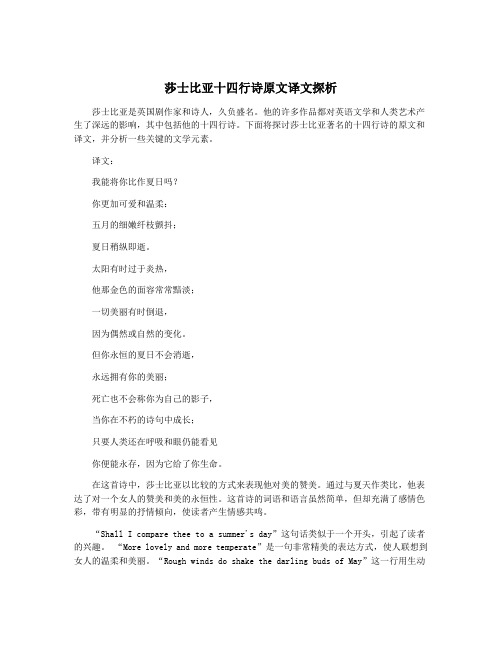
莎士比亚十四行诗原文译文探析莎士比亚是英国剧作家和诗人,久负盛名。
他的许多作品都对英语文学和人类艺术产生了深远的影响,其中包括他的十四行诗。
下面将探讨莎士比亚著名的十四行诗的原文和译文,并分析一些关键的文学元素。
译文:我能将你比作夏日吗?你更加可爱和温柔:五月的细嫩纤枝颤抖;夏日稍纵即逝。
太阳有时过于炎热,他那金色的面容常常黯淡;一切美丽有时倒退,因为偶然或自然的变化。
但你永恒的夏日不会消逝,永远拥有你的美丽;死亡也不会称你为自己的影子,当你在不朽的诗句中成长;只要人类还在呼吸和眼仍能看见你便能永存,因为它给了你生命。
在这首诗中,莎士比亚以比较的方式来表现他对美的赞美。
通过与夏天作类比,他表达了对一个女人的赞美和美的永恒性。
这首诗的词语和语言虽然简单,但却充满了感情色彩,带有明显的抒情倾向,使读者产生情感共鸣。
“Shall I compare thee to a summer's day”这句话类似于一个开头,引起了读者的兴趣。
“More lovely and more temperate”是一句非常精美的表达方式,使人联想到女人的温柔和美丽。
“Rough winds do shake the darling buds of May”这一行用生动的画面展现了夏季的局限性。
接下来,他直言不讳地表达了夏天的缺陷,这是一个关键的反讽,它显示了女人的美丽是超越这些不完美的时令的。
在这首诗的后半部分,莎士比亚开始描述这个女人的永恒美。
他使用非常强的语言来表达它,并表明即使在死亡面前,女人的美丽也将变得不朽。
他用“eternal summer”这个词组来形容这个女人的美丽,这个词组也意味着女人的美丽永恒不变。
他认为,女人的美丽被永远编入了他的诗中,这使得读者可以享受到它的永恒和不朽性。
总之,莎士比亚的十四行诗是一首非常美丽的情诗,它不仅用美丽的文字述说女人的美丽,还有真挚的情感,使读者可以很好地体会到他想传达的思想。
莎士比亚的经典爱情诗
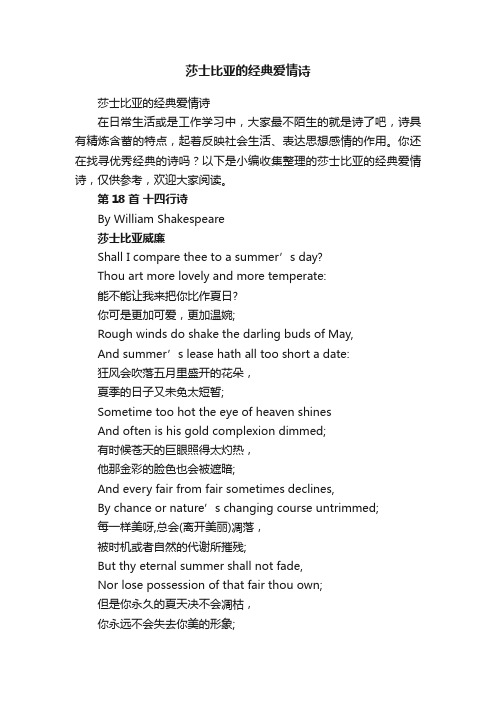
莎士比亚的经典爱情诗莎士比亚的经典爱情诗在日常生活或是工作学习中,大家最不陌生的就是诗了吧,诗具有精炼含蓄的特点,起着反映社会生活、表达思想感情的作用。
你还在找寻优秀经典的诗吗?以下是小编收集整理的莎士比亚的经典爱情诗,仅供参考,欢迎大家阅读。
第18首十四行诗By William Shakespeare莎士比亚威廉Shall I compare thee to a summer’s day?Thou art more lovely and more temperate:能不能让我来把你比作夏日?你可是更加可爱,更加温婉;Rough winds do shake the darling buds of May,And summer’s lease hath all too short a date:狂风会吹落五月里盛开的花朵,夏季的日子又未免太短暂;Sometime too hot the eye of heaven shinesAnd often is his gold complexion dimmed;有时候苍天的巨眼照得太灼热,他那金彩的脸色也会被遮暗;And every fair from fair sometimes declines,By chance or nature’s changing course untrimmed;每一样美呀,总会(离开美丽)凋落,被时机或者自然的代谢所摧残;But thy eternal summer shall not fade,Nor lose possession of that fair thou own;但是你永久的夏天决不会凋枯,你永远不会失去你美的形象;Nor shall death brag thou wander in his shade,When in eternal lines to time thou grow:死神夸不着你在他影子里的踟蹰,你将在不朽的诗中与时间同长;So long as men can breathe, or eyes can see,So long lives this, and this gives life to thee.只要人类在呼吸,眼睛看得见,我这诗就活着,使你的生命绵延。
莎士比亚十四行诗原文译文探析
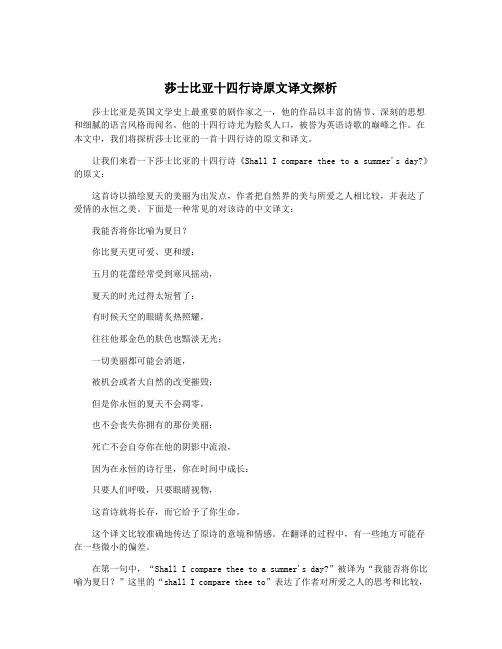
莎士比亚十四行诗原文译文探析莎士比亚是英国文学史上最重要的剧作家之一,他的作品以丰富的情节、深刻的思想和细腻的语言风格而闻名。
他的十四行诗尤为脍炙人口,被誉为英语诗歌的巅峰之作。
在本文中,我们将探析莎士比亚的一首十四行诗的原文和译文。
让我们来看一下莎士比亚的十四行诗《Shall I compare thee to a summer's day?》的原文:这首诗以描绘夏天的美丽为出发点,作者把自然界的美与所爱之人相比较,并表达了爱情的永恒之美。
下面是一种常见的对该诗的中文译文:我能否将你比喻为夏日?你比夏天更可爱、更和缓:五月的花蕾经常受到寒风摇动,夏天的时光过得太短暂了:有时候天空的眼睛炙热照耀,往往他那金色的肤色也黯淡无光;一切美丽都可能会消逝,被机会或者大自然的改变摧毁;但是你永恒的夏天不会凋零,也不会丧失你拥有的那份美丽;死亡不会自夸你在他的阴影中流浪,因为在永恒的诗行里,你在时间中成长:只要人们呼吸,只要眼睛视物,这首诗就将长存,而它给予了你生命。
这个译文比较准确地传达了原诗的意境和情感。
在翻译的过程中,有一些地方可能存在一些微小的偏差。
在第一句中,“Shall I compare thee to a summer's day?”被译为“我能否将你比喻为夏日?”这里的“shall I compare thee to”表达了作者对所爱之人的思考和比较,而“可以将你比喻为”则表达的是一种询问和请求的语气。
译文中的表达方式稍微有些软弱,不太能够传达原文中的自信和自豪之情。
在第二句中,“Thou art more lovely and more temperate”被译为“你比夏天更可爱、更和缓”,这里的“art”是表示存在的动词,应该译为“是”,而不是“比”。
译文中的表达方式稍微有些不准确。
虽然这个译文能够大体上传达原文的意境和情感,但在一些细节的表达上存在一些微小的偏差。
在翻译莎士比亚的十四行诗时,我们应该更加注重原文的语言风格和情感表达,努力做到准确传达原文的意思。
【赏析】莎士比亚《哈姆莱特》

【赏析】莎士比亚《哈姆莱特》莎士比亚:《哈姆莱特》作品内容丹麦王子哈姆莱特本在德国威登堡大学念书,奔父丧回国,见叔父克劳狄斯登上王位,母后乔特露德匆匆改嫁新王,既疑又愤。
好友霍拉旭告知他,父王的鬼魂每天深夜出现在城堡露台。
他按时静候,果然见到亡魂。
倾听诉说后方知父王正是被叔父所害。
哈姆莱特悲愤异常,诅咒这万恶的时代,考虑到形势严峻,他决定装疯卖傻迷惑叔父及奸臣。
他的异常言行引起了克劳狄斯疑虑,便召来哈姆莱特的两个旧友探其真伪。
哈姆莱特忽庄忽谐,疯话间以哲理,使两位佞臣摸不着头脑。
大臣波洛涅斯向新王献策,认为让他的女儿奥菲利娅去约会哈姆莱特,他们可偷听这对恋人的谈话,必能弄清真相。
奸王依计而行,但依然不得要领。
哈姆莱特恐怕鬼魂之言不实,欲进一步证实克劳狄斯的罪行,便请戏班子来宫演剧,并约请克劳狄斯与母后及一干人等同来观剧。
因剧情与克劳狄斯所犯的罪行相仿,奸王心虚,不待剧终,便仓皇离去。
由此,你死我活的斗争真正开始。
克劳狄斯观剧受刺激后,独自在神像前忏悔,哈姆莱特正巧路过,本可一剑将其刺死,但虑及此举会将仇敌送入天堂,便放过了复仇机会,决定待其以后作孽时再动手。
他又来到了母后的寝宫,欲加以规劝,忽闻帷幕之后有动静,以为奸王在偷听便挺剑直刺,不料倒下的竟是邀功心切的波洛涅斯。
克劳狄斯闻知此事惊恐不安,找借口将哈姆莱特遣往英国,王子改写了随行者所带的密信,使两个卖友的小人代自己去英国受死,他则返回丹麦。
登岸后,遇见一个掘墓人一边干活一边在讽喻人生,哈姆莱特大受启发,宿命思想使他决心听天由命、静观其变。
克劳狄斯利用波洛涅斯之子雷欧提斯急于报父仇的心态,挑唆他与哈姆莱特决斗,并准备了毒剑毒酒。
决斗中,奸王假意祝贺哈姆莱特初战告捷,奉上毒酒,王后抢过喝下。
雷欧提斯违规下手,中剑的王子抢过毒剑还刺对手,雷欧提斯临死前揭发了克劳狄斯的阴谋,哈姆莱特在众人惊愕之际刺死罪恶累累的奸王,自己也毒发身亡。
他遗命由挪威王子福丁布拉斯继位。
莎士比亚经典英文诗附译文
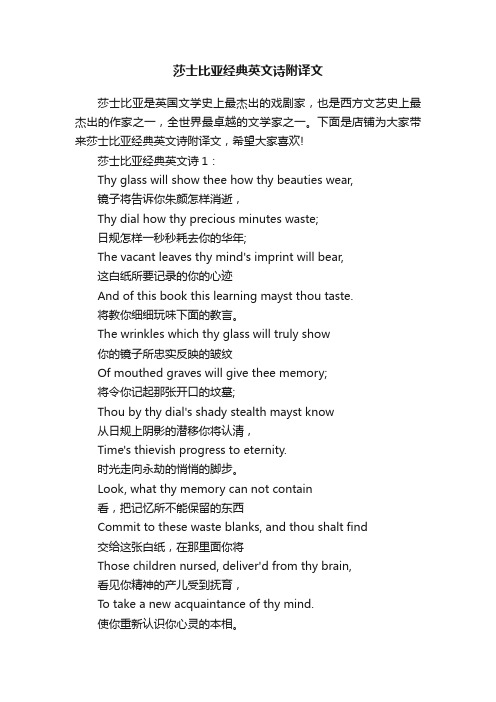
莎士比亚经典英文诗附译文莎士比亚是英国文学史上最杰出的戏剧家,也是西方文艺史上最杰出的作家之一,全世界最卓越的文学家之一。
下面是店铺为大家带来莎士比亚经典英文诗附译文,希望大家喜欢!莎士比亚经典英文诗1:Thy glass will show thee how thy beauties wear,镜子将告诉你朱颜怎样消逝,Thy dial how thy precious minutes waste;日规怎样一秒秒耗去你的华年;The vacant leaves thy mind's imprint will bear,这白纸所要记录的你的心迹And of this book this learning mayst thou taste.将教你细细玩味下面的教言。
The wrinkles which thy glass will truly show你的镜子所忠实反映的皱纹Of mouthed graves will give thee memory;将令你记起那张开口的坟墓;Thou by thy dial's shady stealth mayst know从日规上阴影的潜移你将认清,Time's thievish progress to eternity.时光走向永劫的悄悄的脚步。
Look, what thy memory can not contain看,把记忆所不能保留的东西Commit to these waste blanks, and thou shalt find交给这张白纸,在那里面你将Those children nursed, deliver'd from thy brain,看见你精神的产儿受到抚育,To take a new acquaintance of thy mind.使你重新认识你心灵的本相。
These offices, so oft as thou wilt look,这些日课,只要你常拿来重温,Shall profit thee and much enrich thy book.将有利于你,并丰富你的书本。
莎士比亚经典英文诗带翻译

莎士比亚经典英文诗带翻译莎士比亚经典英文诗1:Or I shall live your epitaph to make,无论我将活着为你写墓志铭,Or you survive when I in earth am rotten;或你未亡而我已在地下腐朽,From hence your memory death cannot take,纵使我已被遗忘得一干二净,Although in me each part will be forgotten.死神将不能把你的忆念夺走。
Your name from hence immortal life shall have,你的名字将从这诗里得永生,Though I, once gone, to all the world must die:虽然我,一去,对人间便等于死;The earth can yield me but a common grave,大地只能够给我一座乱葬坟,When you entombed in men's eyes shall lie.而你却将长埋在人们眼睛里。
Your monument shall be my gentle verse,我这些小诗便是你的纪念碑,Which eyes not yet created shall o'er-read,未来的眼睛固然要百读不厌,And tongues to be your being shall rehearse 未来的舌头也将要传诵不衰,When all the breathers of this world are dead;当现在呼吸的人已瞑目长眠。
You still shall live--such virtue hath my pen--这强劲的笔将使你活在生气Where breath most breathes, even in the mouths of men.最蓬勃的地方,在人们的嘴里。
莎士比亚经典英文诗歌欣赏
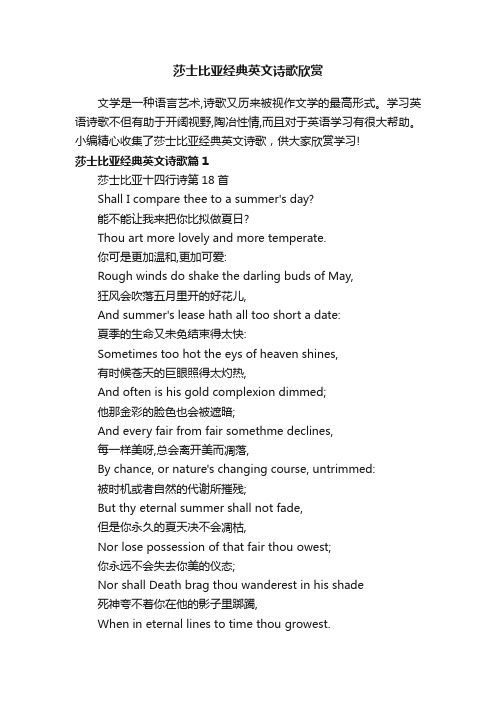
莎士比亚经典英文诗歌欣赏文学是一种语言艺术,诗歌又历来被视作文学的最高形式。
学习英语诗歌不但有助于开阔视野,陶冶性情,而且对于英语学习有很大帮助。
小编精心收集了莎士比亚经典英文诗歌,供大家欣赏学习!莎士比亚经典英文诗歌篇1莎士比亚十四行诗第18首Shall I compare thee to a summer's day?能不能让我来把你比拟做夏日?Thou art more lovely and more temperate.你可是更加温和,更加可爱:Rough winds do shake the darling buds of May,狂风会吹落五月里开的好花儿,And summer's lease hath all too short a date:夏季的生命又未免结束得太快:Sometimes too hot the eys of heaven shines,有时候苍天的巨眼照得太灼热,And often is his gold complexion dimmed;他那金彩的脸色也会被遮暗;And every fair from fair somethme declines,每一样美呀,总会离开美而凋落,By chance, or nature's changing course, untrimmed:被时机或者自然的代谢所摧残;But thy eternal summer shall not fade,但是你永久的夏天决不会凋枯,Nor lose possession of that fair thou owest;你永远不会失去你美的仪态;Nor shall Death brag thou wanderest in his shade死神夸不着你在他的影子里踯躅,When in eternal lines to time thou growest.你将在不朽的诗中与时间同在;So long as men can breathe or eyes can see,只要人类在呼吸,眼睛看得见,So long lives this, and this gives life to thee.我这诗就活着,使你的生命绵延.莎士比亚经典英文诗歌篇2莎士比亚-十四行诗(节选) SONNET 1by:William ShakespeareFROM fairest creatures we desire increase,That thereby beauty's rose might never die,But as the riper should by time decease,His tender heir might bear his memory;But thou,contracted to thine own bright eyes,Feed'st thy light's flame with self-substantial fuel, Making a famine where abundance lies,Thyself thy foe,to thy sweet self too cruel.Thout that are now the world's fresh ornamentAnd only herald to the gaudy spring,Within thine own bud buriest thy contentAnd,tender churl,mak'st waste in niggarding.Pity the world,or else this glutton be,To eat the world's due,by the grave and thee.对天生的尤物我们要求蕃盛,以便美的玫瑰永远不会枯死,但开透的花朵既要及时雕零,就应把记忆交给娇嫩的后嗣;但你,只和你自己的明眸定情,把自己当燃料喂养眼中的火焰,和自己作对,待自己未免太狠,把一片丰沃的土地变成荒田.你现在是大地的清新的点缀,又是锦绣阳春的唯一的前锋,为什么把富源葬送在嫩蕊里,温柔的鄙夫,要吝啬,反而浪用?可怜这个世界吧,要不然,贪夫,就吞噬世界的份,由你和坟墓.莎士比亚经典英文诗歌篇3Great Soliloquies of William ShakespeareRomeo And Juliet: Act 5,Scene 3Romeo: My love! My wife!Death, that hath sucked the honey of thy breath, Hath had no power yet upon thy beauty.Thou are not conquered. Beauty’s ensign yetIs crimson in thy lips and in thy cheeks,And death’s pale flag is not advanced there.Dear Juliet,Why art thou yet so fair? Shall I believeThat unsubstantial Death is amorous,Keeps thee here in dark to be his paramour?Here. O, here will I set up my everlasting restAnd shake the yoke of inauspicious starsFrom this world-wearied flesh.Eyes, look your last!Arms, take your last embrace! And, lips, O youThe doors to breath, seal with a righteous kissA 4)dateless bargain to 5)engrossing death!罗密欧与朱丽叶:第五幕,第三场罗密欧:我的爱人!我的妻子!死神虽然吸干了你甜蜜的气息,却没有力量摧毁你的美丽。
莎士比亚14行情诗中英文全对照

莎士比亚14行情诗中英文全对照抱歉,在看看这些补充的。
三○当我传唤对已往事物的记忆出庭于那馨香的默想的公堂,我不禁为命中许多缺陷叹息,带着旧恨,重新哭蹉跎的时光;于是我可以淹没那枯涸的眼,为了那些长埋在夜台的亲朋,哀悼着许多音容俱渺的美艳,痛哭那情爱久已勾消的哀痛:于是我为过去的惆怅而惆怅,并且一一细算,从痛苦到痛苦,那许多呜咽过的呜咽的旧账,仿佛还未付过,现在又来偿付。
但是只要那刻我想起你,挚友,损失全收回,悲哀也化为乌有。
31Thy bosom is endeared with all hearts,Which I by lacking have supposed dead,And there reigns love and all love's loving parts, And all those friends which I thought buried. How many a holy and obsequious tearHath dear religious love stol'n from mine eye, As interest of the dead, which now appear,But things removed that hidden in thee lie. Thou art the grave where buried love doth live, Hung with the trophies of my lovers gone, Who all their parts of me to thee did give,That due of many, now is thine alone.Their images I loved, I view in thee,And thou (all they) hast all the all of me.三一你的胸怀有了那些心而越可亲(它们的消逝我只道已经死去);原来爱,和爱的一切可爱部分,和埋掉的友谊都在你怀里藏住。
莎士比亚十四行诗原文译文探析
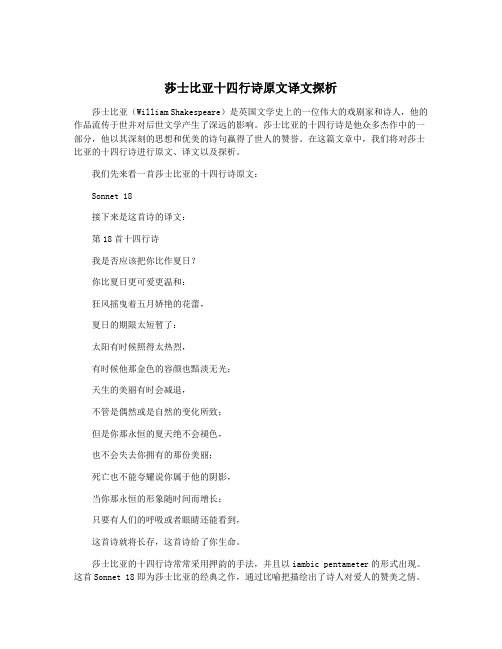
莎士比亚十四行诗原文译文探析莎士比亚(William Shakespeare)是英国文学史上的一位伟大的戏剧家和诗人,他的作品流传于世并对后世文学产生了深远的影响。
莎士比亚的十四行诗是他众多杰作中的一部分,他以其深刻的思想和优美的诗句赢得了世人的赞誉。
在这篇文章中,我们将对莎士比亚的十四行诗进行原文、译文以及探析。
我们先来看一首莎士比亚的十四行诗原文:Sonnet 18接下来是这首诗的译文:第18首十四行诗我是否应该把你比作夏日?你比夏日更可爱更温和:狂风摇曳着五月娇艳的花蕾,夏日的期限太短暂了:太阳有时候照得太热烈,有时候他那金色的容颜也黯淡无光;天生的美丽有时会减退,不管是偶然或是自然的变化所致;但是你那永恒的夏天绝不会褪色,也不会失去你拥有的那份美丽;死亡也不能夸耀说你属于他的阴影,当你那永恒的形象随时间而增长;只要有人们的呼吸或者眼睛还能看到,这首诗就将长存,这首诗给了你生命。
莎士比亚的十四行诗常常采用押韵的手法,并且以iambic pentameter的形式出现。
这首Sonnet 18即为莎士比亚的经典之作,通过比喻把描绘出了诗人对爱人的赞美之情。
诗的开篇即以修辞设问来呈现,作者在问自己是否应该将心上人比作夏日,然后通过下文的赞美,表达出对心上人更为深切的赞美之情。
他认为心上人的美丽胜过夏日,夏日虽然美丽,却不如心上人温和可爱。
由此,诗中呈现了作者对心上人的赞美之情。
在诗的后半部分,诗人使用了“永恒的夏天”来包含对心上人的赞美之语,不管是风吹雨打,都不会改变。
随后,诗人再以修辞手法呼唤死亡无法摧毁对心上人的赞美之情,并肯定了这份美丽将长存与时间,给了心上人永生。
通过以上对原文和译文的对比分析,我们不难发现莎士比亚的十四行诗所蕴含的深刻情感。
诗人通过对夏日和心上人的比较,抒发了对心上人深切的赞美之情,并以永恒的夏天来喻示继续深切的情感长存。
这首诗也正是莎士比亚情感抒发的一个缩影,其深情款款的语言和艺术手法让我们感受到了莎士比亚伟大的文学魅力。
莎士比亚十四行诗原文译文探析
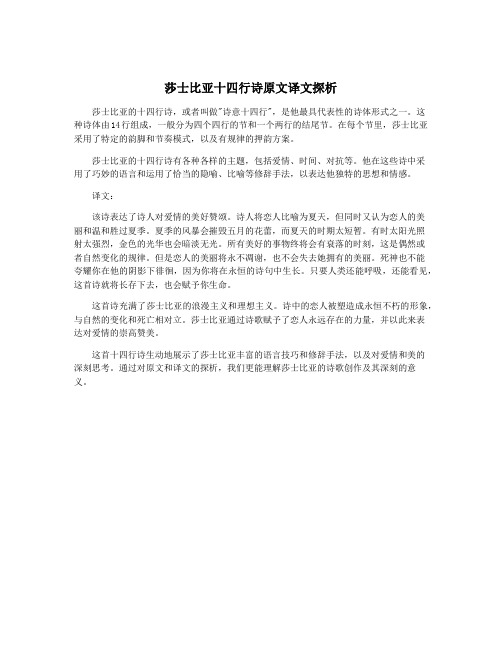
莎士比亚十四行诗原文译文探析
莎士比亚的十四行诗,或者叫做"诗意十四行",是他最具代表性的诗体形式之一。
这
种诗体由14行组成,一般分为四个四行的节和一个两行的结尾节。
在每个节里,莎士比亚采用了特定的韵脚和节奏模式,以及有规律的押韵方案。
莎士比亚的十四行诗有各种各样的主题,包括爱情、时间、对抗等。
他在这些诗中采
用了巧妙的语言和运用了恰当的隐喻、比喻等修辞手法,以表达他独特的思想和情感。
译文:
该诗表达了诗人对爱情的美好赞颂。
诗人将恋人比喻为夏天,但同时又认为恋人的美
丽和温和胜过夏季。
夏季的风暴会摧毁五月的花蕾,而夏天的时期太短暂。
有时太阳光照
射太强烈,金色的光华也会暗淡无光。
所有美好的事物终将会有衰落的时刻,这是偶然或
者自然变化的规律。
但是恋人的美丽将永不凋谢,也不会失去她拥有的美丽。
死神也不能
夸耀你在他的阴影下徘徊,因为你将在永恒的诗句中生长。
只要人类还能呼吸,还能看见,这首诗就将长存下去,也会赋予你生命。
这首诗充满了莎士比亚的浪漫主义和理想主义。
诗中的恋人被塑造成永恒不朽的形象,与自然的变化和死亡相对立。
莎士比亚通过诗歌赋予了恋人永远存在的力量,并以此来表
达对爱情的崇高赞美。
这首十四行诗生动地展示了莎士比亚丰富的语言技巧和修辞手法,以及对爱情和美的
深刻思考。
通过对原文和译文的探析,我们更能理解莎士比亚的诗歌创作及其深刻的意
义。
莎士比亚的诗

莎士比亚的诗莎士比亚(1564年4月23日-1616年4月23日),华人社会常尊称为莎翁,是英国文学史上最杰出的戏剧家,也是欧洲文艺复兴时期最重要、最伟大的作家之一,当时人文主义文学的集大成者,以及全世界最卓越的文学家之一。
莎士比亚诗如下:1、《十四行诗》当我看到,一切生长之物,只在刹那间能够完美;世界舞台上一无所有,唯有星辰在秘密中牵引。
我看到人类像草木一样生长,被同样的天空赋予盛衰。
少时繁茂,日中则仄,一切美好都从记忆中被抹去!于是这瞬间停留的诡计,让你青春的容颜出现在我面前。
而残暴的时间和腐朽商议,要把你青春的白日变成暗淡黑夜,为了爱你,我将和时间对抗,它从你身上夺走的,我会重新嫁接。
2、《哈姆雷特》内心之事宜缄口,仓促之念莫妄行,为人友善忌轻浮,患难之友可深交,酒肉之情应远离。
3、《哈姆雷特》生存或毁灭,这是个必答之问题:是否应默默的忍受坎坷命运之无情打击,还是应与深如大海之无涯苦难奋然为敌,并将其克服。
此二抉择,究竟是哪个较崇高?死即睡眠,它不过如此!倘若一眠能了结心灵之苦楚与肉体之百患,那么,此结局是可盼的!死去,睡去……但在睡眠中可能有梦,啊,这就是个阻碍:当我们摆脱了此垂死之皮囊,在死之长眠中会有何梦来临?它令我们踌躇,使我们心甘情愿的承受长年之灾,否则谁肯容忍人间之百般折磨,如暴君之政、骄者之傲、失恋之痛、法章之慢、贪官之侮、或庸民之辱,假如他能简单的一刃了之?还有谁会肯去终生做牛做马。
莎士比亚最经典的九首十四行诗
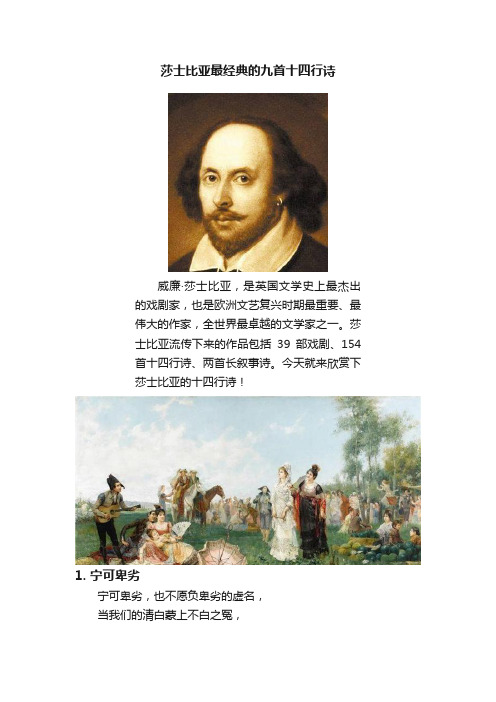
莎士比亚最经典的九首十四行诗威廉·莎士比亚,是英国文学史上最杰出的戏剧家,也是欧洲文艺复兴时期最重要、最伟大的作家,全世界最卓越的文学家之一。
莎士比亚流传下来的作品包括39部戏剧、154首十四行诗、两首长叙事诗。
今天就来欣赏下莎士比亚的十四行诗!1. 宁可卑劣宁可卑劣,也不愿负卑劣的虚名,当我们的清白蒙上不白之冤,当正当的娱乐被人妄加恶声,不体察我们的感情,只凭偏见。
为什么别人虚伪淫猥的眼睛有权赞扬或诋毁我活跃的血?专侦伺我的弱点而比我坏的人为什么把我认为善的恣意污蔑?我就是我,他们对于我的诋毁只能够宣扬他们自己的卑鄙:我本方正,他们的视线自不轨;这种坏心眼怎么配把我非议?除非他们固执这糊涂的邪说:恶是人性,统治着世间的是恶。
2. 爱是亘古长明的灯塔我绝不承认两颗真心的结合,会有任何障碍;爱算不得真爱,若是一看见人家改变便转舵,或者一看见人家转弯便离开。
哦,绝不!爱是亘古长明的灯塔,它定睛望着风暴却兀不为动;爱又是指引迷舟的一颗恒星,你可量它多高,它所值却无穷。
爱不受时光的播弄,尽管红颜和皓齿难免遭受时光的毒手;爱并不因瞬息的改变而改变,它巍然矗立直到末日的尽头。
我这话若说错,并被证明不确,就算我没写诗,也没人真爱过。
3. 我怎么能够把你来比作夏天怎么能够把你来比作夏天?你不独比它可爱也比它温婉狂风把五月宠爱的嫩蕊作践,夏天出凭的期限由未免太短天上的眼睛有时照得太酷烈它那炳耀的金颜又常遭掩蔽被机缘或无常的天道所摧折,没有芳艳不终于凋残或销毁但是你的长夏永远不会凋落也不会损失你这皎洁的红芳或死神夸口你在他的影里漂泊当你在不朽的诗里与时同长只要有人类,或人有眼睛,这诗将长存,并赐给你生命。
4. 你的爱怜抹掉那世俗的讥谗你的爱怜抹掉那世俗的讥谗,打在我额上的耻辱的烙印;别人的毁誉对我有什么相干,你既表扬我的善又把恶遮隐!你是我整个宇宙,我必须努力从你的口里听取我的荣和辱;我把别人,别人把我,都当作死,谁能使我的铁心肠变善或变恶?别人的意见我全扔入了深渊,那么干净,我简直像聋蛇一般,凭他奉承或诽谤都充耳不闻。
莎士比亚十四行诗中文

莎士比亚十四行诗中文一对天生的尤物我们要求蕃盛,以便美的玫瑰永远不会枯死,但开透的花朵既要及时雕零,就应把记忆交给娇嫩的后嗣;但你,只和你自己的明眸定情,把自己当燃料喂养眼中的火焰,和自己作对,待自己未免太狠,把一片丰沃的土地变成荒田。
你现在是大地的清新的点缀,又是锦绣阳春的唯一的前锋,为什么把富源葬送在嫩蕊里,温柔的鄙夫,要吝啬,反而浪用,可怜这个世界吧,要不然,贪夫,就吞噬世界的份,由你和坟墓。
二当四十个冬天围攻你的朱颜,在你美的园地挖下深的战壕,你青春的华服,那么被人艳羡,将成褴褛的败絮,谁也不要瞧:那时人若问起你的美在何处,哪里是你那少壮年华的宝藏,你说,“在我这双深陷的眼眶里,是贪婪的羞耻,和无益的颂扬。
” 你的美的用途会更值得赞美,如果你能够说,“我这宁馨小童将总结我的账,宽恕我的老迈,” 证实他的美在继承你的血统~这将使你在衰老的暮年更生,并使你垂冷的血液感到重温。
三照照镜子,告诉你那镜中的脸庞,说现在这庞儿应该另造一副;如果你不赶快为它重修殿堂,就欺骗世界,剥掉母亲的幸福。
因为哪里会有女人那么淑贞她那处女的胎不愿被你耕种,哪里有男人那么蠢,他竟甘心做自己的坟墓,绝自己的血统, 你是你母亲的镜子,在你里面她唤回她的盛年的芳菲四月:同样,从你暮年的窗你将眺见——纵皱纹满脸——你这黄金的岁月。
但是你活着若不愿被人惦记,就独自死去,你的肖像和你一起。
四俊俏的浪子,为什么把你那份美的遗产在你自己身上耗尽, 造化的馈赠非赐予,她只出赁; 她慷慨,只赁给宽宏大量的人。
那么,美丽的鄙夫,为什么滥用那交给你转交给别人的厚礼, 赔本的高利贷者,为什么浪用那么一笔大款,还不能过日子, 因为你既然只和自己做买卖,就等于欺骗你那妩媚的自我。
这样,你将拿什么账目去交代,当造化唤你回到她怀里长卧, 你未用过的美将同你进坟墓; 用呢,就活着去执行你的遗嘱。
五那些时辰曾经用轻盈的细工织就这众目共注的可爱明眸,终有天对它摆出魔王的面孔,把绝代佳丽剁成龙锺的老丑: 因为不舍昼夜的时光把盛夏带到狰狞的冬天去把它结果; 生机被严霜窒息,绿叶又全下,白雪掩埋了美,满目是赤裸裸: 那时候如果夏天尚未经提炼,让它凝成香露锁在玻璃瓶里,美和美的流泽将一起被截断,美,和美的记忆都无人再提起: 但提炼过的花,纵和冬天抗衡,只失掉颜色,却永远吐着清芬。
莎士比亚十四行诗原文译文探析

莎士比亚十四行诗原文译文探析莎士比亚(William Shakespeare)是英国文学史上最伟大的剧作家之一,他的作品涵盖了多种题材和风格。
他的十四行诗被认为是他最具影响力的作品之一,也是他最著名的作品之一。
本文将探析几首莎士比亚的十四行诗的原文和译文,并对其进行解读和分析。
莎士比亚的十四行诗通常采用带有特定押韵格式的诗体,每行诗由十个音节(五对抑扬格)组成。
这种押韵格式被称为“莎士比亚诗体”或“英文十四行诗”。
莎士比亚的十四行诗主题涉及爱情、时间、美丽和死亡等广泛的话题,同时通过精炼的语言和演绎力强的形象描绘给读者深刻的印象。
首先让我们来看一首莎士比亚的十四行诗《当时所有最美丽的东西》,其原文如下:这首诗是莎士比亚的一首十分经典的爱情诗,表达了诗人对爱人美丽不朽的赞美。
诗中,诗人用夏日与爱人进行类比,并通过对夏日的描绘暗示出夏日的不完美与短暂。
与夏日相比,爱人的美丽更加温和和可贵。
诗人通过强烈的比较,表达了对爱人美丽的欣赏和爱恋的深度。
诗人还表达了对爱人不朽之美的赞赏。
诗中的“thy eternal summer shall not fade”表明爱人的美丽将永不褪色。
而最后两句“so long as men can breathe or eyes can see, so long lives this, and this gives life to thee.”则意味着这首诗将永远存在,并赋予了爱人永恒的生命。
下面是这首诗的中文译文:我可将你比喻为一个夏日吗?你比夏日更可爱、更温和:七月的风暴震动五月的爱芽,而夏日的租期太短暂:天空的眼睛有时炙热明亮,他的金色面容经常暗淡;美好婀娜终究会凋零,因时间流转,自然遗散;然而你永恒的夏天永不褪色,不失去拥有你这份美丽;死亡也别炫耀你走过阴影,因为你在永恒的诗歌里成长:只要人们呼吸、眼睛可见,它将长存,因它赋予你生命。
这个译文着重保持了原诗的意境和韵律,准确传达了原诗的主旨和情感。
外国爱情诗赏析《我的情人的眼睛绝不像太阳》英国〕莎士比亚
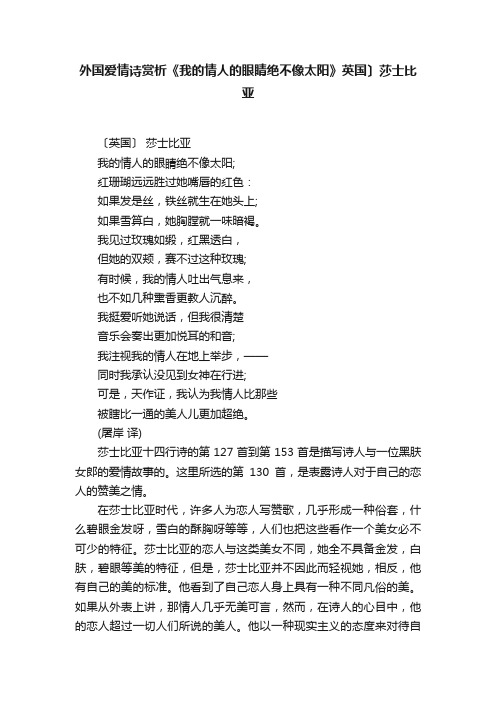
外国爱情诗赏析《我的情人的眼睛绝不像太阳》英国〕莎士比亚〔英国〕莎士比亚我的情人的眼睛绝不像太阳;红珊瑚远远胜过她嘴唇的红色:如果发是丝,铁丝就生在她头上;如果雪算白,她胸膛就一味暗褐。
我见过玫瑰如缎,红黑透白,但她的双颊,赛不过这种玫瑰;有时候,我的情人吐出气息来,也不如几种熏香更教人沉醉。
我挺爱听她说话,但我很清楚音乐会奏出更加悦耳的和音;我注视我的情人在地上举步,——同时我承认没见到女神在行进;可是,天作证,我认为我情人比那些被瞎比一通的美人儿更加超绝。
(屠岸译)莎士比亚十四行诗的第127首到第153首是描写诗人与一位黑肤女郎的爱情故事的。
这里所选的第130首,是表露诗人对于自己的恋人的赞美之情。
在莎士比亚时代,许多人为恋人写赞歌,几乎形成一种俗套,什么碧眼金发呀,雪白的酥胸呀等等,人们也把这些看作一个美女必不可少的特征。
莎士比亚的恋人与这类美女不同,她全不具备金发,白肤,碧眼等美的特征,但是,莎士比亚并不因此而轻视她,相反,他有自己的美的标准。
他看到了自己恋人身上具有一种不同凡俗的美。
如果从外表上讲,那情人几乎无美可言,然而,在诗人的心目中,他的恋人超过一切人们所说的美人。
他以一种现实主义的态度来对待自己的恋人,他不受世俗标准的左右,他爱的是自己心目中真正值得爱慕的人。
诗中从头至尾运用对比的手法,把一般人看重的美与自己的恋人来进行比较,从眼睛、嘴唇、胸膛、头发、脸颊,直到气味、语言和步履,共八个方面,一层层地比,又一层层地予以否定,几乎要把自己的恋人比得一无是处。
这八个方面的比较,写法并不一样。
从第1句到第4句,包含四个方面的比较,一句一比,显得急促,简略。
它们是从外形和相貌上,通过对比烘托出一个姿色平常的黑肤姑娘。
从第5句到第12句,则是两句一比,语气显得比前四句平缓,内容是从气质上来描写自己的恋人——一个平凡的女子。
她像平常人一样的呼吸,像平常人一样的说话,像平常人一样的走路。
这里也有四个方面的比较,作为比较的对照物,则是玫瑰、芳香、音乐、女神,一层比一层超脱,一层比一层虚玄。
莎士比亚经典英文诗歌带翻译
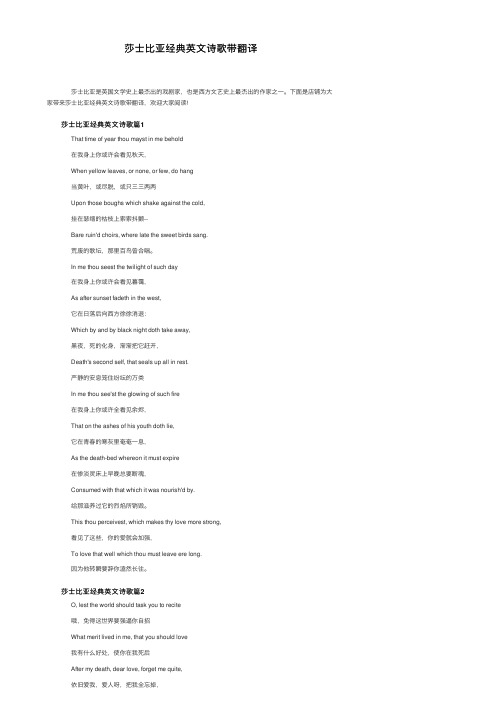
莎⼠⽐亚经典英⽂诗歌带翻译 莎⼠⽐亚是英国⽂学史上最杰出的戏剧家,也是西⽅⽂艺史上最杰出的作家之⼀。
下⾯是店铺为⼤家带来莎⼠⽐亚经典英⽂诗歌带翻译,欢迎⼤家阅读! 莎⼠⽐亚经典英⽂诗歌篇1 That time of year thou mayst in me behold 在我⾝上你或许会看见秋天, When yellow leaves, or none, or few, do hang 当黄叶,或尽脱,或只三三两两 Upon those boughs which shake against the cold, 挂在瑟缩的枯枝上索索抖颤-- Bare ruin'd choirs, where late the sweet birds sang. 荒废的歌坛,那⾥百鸟曾合唱。
In me thou seest the twilight of such day 在我⾝上你或许会看见暮霭, As after sunset fadeth in the west, 它在⽇落后向西⽅徐徐消退: Which by and by black night doth take away, ⿊夜,死的化⾝,渐渐把它赶开, Death's second self, that seals up all in rest. 严静的安息笼住纷纭的万类 In me thou see'st the glowing of such fire 在我⾝上你或许全看见余烬, That on the ashes of his youth doth lie, 它在青春的寒灰⾥奄奄⼀息, As the death-bed whereon it must expire 在惨淡灵床上早晚总要断魂, Consumed with that which it was nourish'd by. 给那滋养过它的烈焰所销毁。
This thou perceivest, which makes thy love more strong, 看见了这些,你的爱就会加强, To love that well which thou must leave ere long. 因为他转瞬要辞你溘然长往。
- 1、下载文档前请自行甄别文档内容的完整性,平台不提供额外的编辑、内容补充、找答案等附加服务。
- 2、"仅部分预览"的文档,不可在线预览部分如存在完整性等问题,可反馈申请退款(可完整预览的文档不适用该条件!)。
- 3、如文档侵犯您的权益,请联系客服反馈,我们会尽快为您处理(人工客服工作时间:9:00-18:30)。
2011—2012第一学期实践教学William ShakespeareWilliam Shakespeare (26 April 1564- 23 April 1616) was an English poet and playwright. He was widely regarded as the greatest writer in the English language and the world's pre-eminent dramatist. His surviving works, including some collaboration, consist of about 38 plays, 154 sonnets, two long narrative poems, and several other poems. His plays have been translated into every major living language and are performed more often than those of any other playwright.Shakespeare was born and raised in Stratford-upon-Avon. At the age of 18, he married Anne Hathaway, with whom he had three children: Susanna, and twins Hamnet and Judith. Between 1585 and 1592, he began a successful career in London as an actor, writer, and part owner of a playing company called the Lord Chamberlain's Men, later known as the King's Men.Shakespeare produced most of his known work between 1589 and 1613. His early plays were mainly comedies and histories, genres he raised to the peak of sophistication and artistry by the end of the 16th century. He then wrote mainly tragedies until about 1608, including Hamlet, King Lear, Othello, and Macbeth, considered some of the famous works.Shakespeare was a respected poet and playwright in his own day, but his reputation did not rise to its present heights until the 19th century. In the 20th century, his work was repeatedly adopted and rediscovered by new movements in scholarship and performance. His plays remain highly popular today and are constantly studied, performed and reinterpreted in diverse cultural and political contexts throughout the world.(Sonnet1 和sonnet5的相关资料由张文瑞提供)Sonnet 1That thereby beauty's rose might never die,But as the riper should by time decease,His tender heir might bear his memory;But thou, contracted to thine own bright eyes,Making a famine where abundance lies,Thyself that art now the world's fresh ornamentAnd only herald to the gaudy springWithin thine own bud buriest thy content,And, tender churl, mak'st waste in niggarding.To eat the world's due, by the grave and thee.(辜正坤《莎士比亚十四行诗》2008年1月第一版)译文:我们总愿美的物种繁衍昌盛,好让美的玫瑰永远也不凋零。
纵然时序难逆,物壮必老,自有年轻的子孙一脉相承。
而你,却只与自己的明眸订婚,焚身为火,好烧出眼中的光明。
你与自我为敌,作践可爱的自身,有如在丰饶之乡偏造成满地饥民。
你是当今世界鲜美的装饰,你是锦绣春光里报春的先行。
你用自己的花苞埋葬了自己的花精,如慷慨吝啬者用吝啬将血本赔尽。
可怜这个世界吧,你这贪得无厌之人,不留遗嗣在世间,只落得萧条葬孤坟。
(辜正坤译)评论一:这第一首诗,诗人开宗明义地提出:熟透了的东西随时会殒落,血亲后嗣就该继承他的遗业,要美的生命不断繁衍孳生,艳丽的玫瑰才不会凋谢。
这是自然法则,也启示着现实中人应步的常道。
但是朋友,你却不去寻结连理,只独钟其身,恰似和自己的眼睛订婚,燃尽自身,也只能烧炼出双眸的光焰,而不能把你的美传诸后人。
这是和自己作对,就会在丰饶的田野上酿出了饥馑。
你本是天地的精华,鲜艳的珍品,自应婚娶,生育美的后代,为灿烂的春天开路。
而你却不肯与美人结合,愿在自身的花蕾里埋葬了自己。
这种自怜的吝啬,酿成了毁灭的浪费,该有多么可惜与可叹啊!所以,诗人于最后剀切陈情:亲爱的朋友,可怜这世界吧,你不能违背自然规律,把世界应得的统统让坟墓吞去,和你一同消逝。
从上段可以看出,这首诗主要表达莎士比亚一方面非常惋惜朋友独自生活而不肯结连理的情感,另一方面又在极力劝说他的朋友,传宗接代是自然规律,不能违背,留下后代才能让美永存,所以要赶快婚娶啊!蕴含着文艺复兴时代,一个人文主义者赤诚的现实主义精神。
您听到了吗,诗人在为春天开路,为美的永驻而呐喊哩!莎士比亚《十四行诗》的1-17首形成一组,具有同一主题,都是诗人劝他的青年好友应该结婚的。
因为,时间在改变一切,他那美的形貌也会消逝;只有结婚生育,才能在后代的身上永驻青春。
从这组诗里,我们得识诗人那积极进取的人生哲理与现实主义精神。
开篇的十七首诗,主题随同,但是莎氏以不同的譬喻,从不同的角度,提炼、抒发为深沉的诗。
来源:/question/263213139.html评论二:第一首十四行诗中的第六行,有一个短语“self—substantial fuel(把自己当燃料)”。
这是一个蜡烛的意象,蜡烛燃烧自己旨在为世界带来光明,但这只是个短暂的瞬间。
蜡烛燃尽后,世界依然一片黑暗。
除了短暂的光明,蜡烛熄灭后什么都没给世界留下。
从某种意义上说,这是一种浪费。
同理,如果诗中的主人翁不生子来延续他的美貌,这也是一种浪费。
因为诗中主人翁的美貌然此刻让世界光彩夺目。
但他死后会因无人延续他的美而让世界再次暗淡无光。
所以,在劝说者看来,诗中主人翁应该结婚并生子来延续他的美。
当他逝去时,他的子孙后代才能把他的美传承下去,才能让世界永远“光明”。
在第一首十四行诗中,劝说者的语气由善意的忠告逐渐转为严重的警告。
诗人在第一诗节中陈述了青春美貌终将随时间逝去的永恒真理,“But as the riper should by time decrease”在第二诗节中,劝说者坦言:如果诗中的主人翁不结婚生子,那么他对自己就太“残忍”了,“To thy sweet self too cruel”因为他没有利用好他的美貌,死后不能为世界留下一子半女来延续他的美貌,让世人分享。
接着在第三诗节中,劝说者的语气在逐渐转变。
他把适婚年龄不结婚的人称为“吝啬鬼”,“tender churl,mak’st waste in”这里的“吝啬鬼”在笔者看来有两层意思,一方面,诗中的主人翁吝啬于把自己的爱放在女人身上,他爱自己胜过一切,所以不愿意结婚。
另一方面,他吝啬于结婚后生子来复制自己的美貌从而让世人分享。
在最后一节中,劝说者似乎对诗中主人翁的态度很生气,并警告他说如果你不想结婚,死亡将等待着你,“To eat thewodd’s due,by the grave and thee”在这首十四行诗的开头,诗人只是摆事实,讲道理。
而在第二诗节中,开始劝说年轻人不要对自己太残忍。
第三诗节语气转而有些愤怒,用“吝啬鬼”一词来称呼像年轻人这样,有着美貌而不愿结在这首十婚生子让后人分享美的人。
最后两行的语气可以说从愤怒转到了诅咒。
诗人认为,年轻人如果不结婚生子,就应该死去,因为这是他欠世界的东西。
在第一首十四行诗中,玫瑰的枯萎喻示着青春的流逝。
在第一诗节,劝说者坦言时间将使玫瑰(“riper”)死亡,唯有娇嫩的后嗣(“tenderheir”)可以证明它年轻时的苟烂。
这里红玫瑰代表着年轻和美貌,而娇嫩的后嗣则指孩子。
所以,如果诗中主人翁想证实自己年轻时的美貌,就必须结婚、生子。
否则,当时光飞逝,不通过孩子没人知道他曾经的美貌。
在第五首十四行诗中,时间被隐喻地描述成一个暴君(“tyrant”)。
永不停步的时间残酷地把多彩的夏季带入荒凉的冬季。
夏季喻示着青春,而冬季则意味着年老。
“暴君”将不会对美丽的青春心生怜悯而停止它前进的脚步,所以诗中的主人翁唯有早日在年轻时结婚生子。
否则,当“暴君”把你的青春与美貌一并带走后,一切都是徒劳,这世上再没人复制你的美貌并把它延续下去。
来源:刘吉俊思茅师范高等专科学校学报 2011年2月第27卷第1期(思茅师范高等专科学校英语系。
云南普洱665000)Sonnet 5Those hours, that with gentle work did frameThe lovely gaze where every eye doth dwell,Will play the tyrants to the very sameAnd that unfair which fairly doth excel:For never-resting time leads summer onTo hideous winter and confounds him there;Sap checked with frost and lusty leaves quite gone,Beauty o'ersnow'd and bareness every where:Then, were not summer's distillation left,A liquid prisoner pent in walls of glass,Beauty's effect with beauty were bereft,Nor it nor no remembrance what it was,But flowers distill'd though they with winter meet,Lose but their show; their substance still lives sweet.(辜正坤《莎士比亚十四行诗》2008年1月第一版)译文:时光老人曾用精雕细刻刻出这众目所归的美颜,也会对它施暴虐于某一天,叫倾国之貌转眼丑态毕现。
